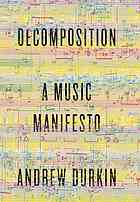
Decomposition
A Music Manifesto
کتاب های مرتبط
- اطلاعات
- نقد و بررسی
- دیدگاه کاربران
نقد و بررسی

September 22, 2014
In this tedious but also provocative study, performer and composer Durkin challenges readers to think beyond musical composition as the work of an individual genius and to probe instead the ways that various audiences receive the work, the ways that diverse technologies help create it, and the several channels of collaboration that help make it. Attempting to illustrate how culture relates to and defines music, he argues that “audience” is a broad “phenomenon that includes... the technicians who build instruments as well as the musicians themselves,” so that any performance of a musical composition is the result of a network extending far beyond its immediate listeners. Drawing on music as diverse as Duke Ellington’s, Beethoven’s, and Frank Zappa’s, Durkin demonstrates the challenges of locating the “authentic” performance or version of a piece of music, showing how each time the musical piece is heard, it contains different emotions and meanings for listeners. Durkin also explores the changing worlds of digital technologies and copyright as he examines how deeply the medium affects the reception of the music and its exposure to multiple re-compositions. Durkin presents a new way of thinking about how we receive music.

December 1, 2014
Durkin, a musician and composer, deals with the notion of authorship in music. Initially using Duke Ellington and Beethoven as examples, he contends that musical authorship represents a collaborative process, which involves the initiating composer as well as designers, marketers, technologists, and even listeners. He spends much of the book reiterating his point with dozens of examples and quotes from recent commentators to dispel the notion of the solitary genius. In the sixth chapter, the author addresses the notion of authenticity, which he defines as the ideal musical experience (records, live performance, transcription, etc.) and argues the limitations of any specific type of musical occurrence. In the final chapter, Durkin focuses on the connections and implications of commerce on music, especially in the digital age. VERDICT Though raising some interesting issues about music in the age of the Internet, the author convincingly battles the academic straw man of the heavenly inspired composer but ironically ignores the importance of historical social context on the musical creation process. This title will largely appeal to academics who continue to focus on a somewhat archaic debate.--David P. Szatmary, Univ. of Washington, Seattle
Copyright 2014 Library Journal, LLC Used with permission.

November 15, 2014
A comprehensive and revisionary exploration of musicall musicis the ambitious objective of composer, performer, and music-scholar Durkin. That he even comes close is remarkable. He explores in great depth notions of the genius of composition, invoking not only the distinction between composition and collaboration in the (obvious) example of Duke Ellington's orchestra (although nearly all jazz lends itself to this sort of discussion) but even in the music of player pianos, the seemingly noncollaborative work of modern composer Conlon Nancarrow, or some deliberately nonplayable work of Frank Zappa. He similarly examines the concept of authenticity, reducing it beyond an absurdity in several of his examples (including Milli Vanilli) taken from all varieties of music and music criticism. Audiences, he cites, often prefer reenactments of music videos rather than live performance. This book is the outgrowth of a dissertation, and it shows, being for the most part provocative but at times overly insistent in the points being made.(Reprinted with permission of Booklist, copyright 2014, American Library Association.)

























دیدگاه کاربران